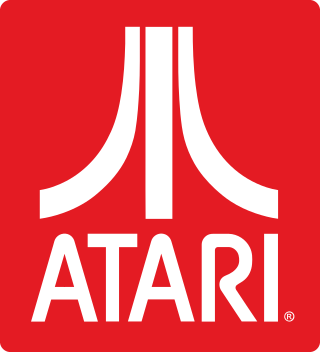
Atari is a brand name that has been owned by several entities since its inception in 1972. It is currently owned by French holding company Atari SA. The original Atari, Inc., founded in Sunnyvale, California, United States in 1972 by Nolan Bushnell and Ted Dabney, was a pioneer in arcade games, home video game consoles, and home computers. The company's products, such as Pong and the Atari 2600, helped define the electronic entertainment industry from the 1970s to the mid-1980s.

The Atari 2600 is a home video game console developed and produced by Atari, Inc. Released in September 1977 as the Atari Video Computer System, it popularized microprocessor-based hardware and games stored on swappable ROM cartridges, a format first used with the Fairchild Channel F in 1976. The VCS was bundled with two joystick controllers, a conjoined pair of paddle controllers, and a game cartridge—initially Combat and later Pac-Man. Sears sold the system as the Tele-Games Video Arcade. Atari rebranded the VCS as the Atari 2600 in November 1982, alongside the release of the Atari 5200.

Pong is a table tennis–themed twitch arcade sports video game, featuring simple two-dimensional graphics, manufactured by Atari and originally released on 29 November 1972. It is one of the earliest arcade video games; it was created by Allan Alcorn as a training exercise assigned to him by Atari co-founder Nolan Bushnell, but Bushnell and Atari co-founder Ted Dabney were surprised by the quality of Alcorn's work and decided to manufacture the game. Bushnell based the game's concept on an electronic ping-pong game included in the Magnavox Odyssey, the first home video game console. In response, Magnavox later sued Atari for patent infringement.

Nolan Kay Bushnell is an American businessman and electrical engineer. He established Atari, Inc. and the Chuck E. Cheese's Pizza Time Theatre chain. He has been inducted into the Video Game Hall of Fame and the Consumer Electronics Association Hall of Fame, received the BAFTA Fellowship and the Nations Restaurant News "Innovator of the Year" award, and was named one of Newsweek's "50 Men Who Changed America". He has started more than 20 companies and is one of the founding fathers of the video game industry. He is on the board of Anti-Aging Games. In 2012, he founded an educational software company called Brainrush, that is using video game technology in educational software.
1972 marked an important landmark in the history of the video game industry with the releases of Pong and the Odyssey home console. The profile of electronic games rose substantially and companies began exploring the distribution of video games on a larger scale. Important mainframe computer games were created in this period which became the basis for early microcomputer games.
A catalyst is a substance which changes the rate of a chemical reaction.
A business incubator is an organization that helps startup companies and individual entrepreneurs to develop their businesses by providing a fullscale range of services, starting with management training and office space, and ending with venture capital financing. The National Business Incubation Association (NBIA) defines business incubators as a catalyst tool for either regional or national economic development. NBIA categorizes its members' incubators by the following five incubator types: academic institutions; non-profit development corporations; for-profit property development ventures; venture capital firms, and a combination of the above.
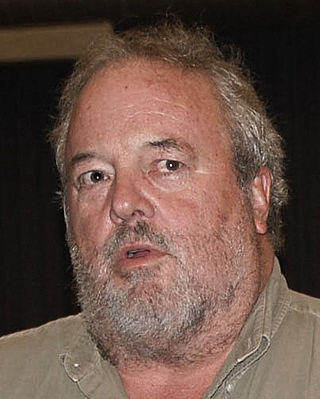
Allan Alcorn is an American pioneering engineer and computer scientist best known for creating Pong, one of the first video games. In 2009, he was chosen by IGN as one of the top 100 game creators of all time.

Samuel Frederick "Ted" Dabney Jr. was an American electrical engineer, and the co-founder, alongside Nolan Bushnell, of Atari, Inc. He is recognized as developing the basics of video circuitry principles that were used for Computer Space and later Pong, one of the first and most successful arcade games.

Kee Games was an American arcade game manufacturer that released arcade and video games from 1973 to 1978.
A navigation system is a computing system that aids in navigation. Navigation systems may be entirely on board the vehicle or vessel that the system is controlling or located elsewhere, making use of radio or other signal transmission to control the vehicle or vessel. In some cases, a combination of these methods is used.
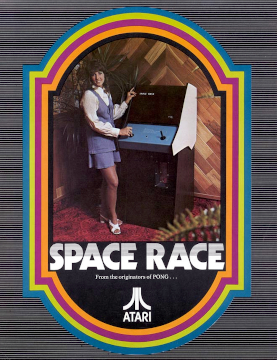
Space Race is an arcade game developed by Atari, Inc. and released on July 16, 1973. It was the second game by the company, after Pong (1972), which marked the beginning of the commercial video game industry along with the Magnavox Odyssey. In the game, two players each control a rocket ship, with the goal of being the first to move their ship from the bottom of the screen to the top. Along the way are asteroids, which the players must avoid. Space Race was the first racing arcade video game and the first game with a goal of crossing the screen while avoiding obstacles.
NeoEdge Networks was a Silicon Valley–based technology and in-game advertising company that enabled casual game publishers and developers to deliver television-like commercials within their products – frequently in the context of free-to-consumer casual game play. NeoEdge powered advertising for a variety of game publishers including Yahoo. NeoEdge provided both peer-to-peer game distribution and in-game advertising . It was renamed Blue Noodle in early 2011 and shut down later that year.

AG Bear is a talking teddy bear that responds to the sound of human voice. He was designed by Ron Milner, and manufactured by Axlon, a company formed by Nolan Bushnell, founder of Atari and Chuck E. Cheese, through his Catalyst Technologies venture capital firm. The manufacturer's tag lists the bear's production date as 1985. The bear wears a durable collared blue shirt with its name embroidered in yellow letters on the front. The shirt has a velcro strap in the back and the bear has a zipper that secures the internal black voice box.
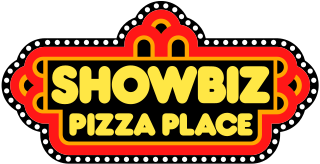
ShowBiz Pizza Place, or simply ShowBiz Pizza, was an American family entertainment center and restaurant pizza chain founded in 1980 by Robert L. Brock and Creative Engineering (CEI). It emerged after a separation between Brock and owners of the Chuck E. Cheese franchise, Pizza Time Theatre. ShowBiz Pizza restaurants entertained guests through a large selection of arcade games, coin-operated rides, and animatronic stage shows.

Masaya Nakamura was a Japanese businessman and the founder of Namco. He was the company's president up until 2002, where he took a ceremonial role in its management. Following the formation of Bandai Namco Holdings, Nakamura would retain an honorary position in the video game division, Bandai Namco Entertainment.

Atari, Inc. was an American video game developer and home computer company founded in 1972 by Nolan Bushnell and Ted Dabney. Atari was a key player in the formation of the video arcade and video game industry.
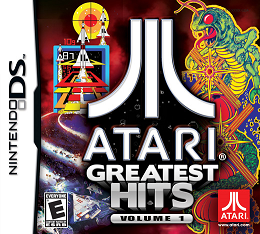
The Atari Greatest Hits series is composed of compilations of Atari arcade games & Atari 2600 games ported to the Nintendo DS and Apple iOS. The Nintendo DS games were split into two volumes released in 2010 and 2011 resepctively, while the app was released as a Free-to-play model, and allowed for purchase of the extra games. The games include bonus features such as manuals, credits and interviews with Atari founder Nolan Bushnell.

Bushnell's Law or Nolan's Law is an aphorism often attributed to Atari founder Nolan Bushnell, on the subject of video game design:
All the best games are easy to learn and difficult to master. They should reward the first quarter and the hundredth.
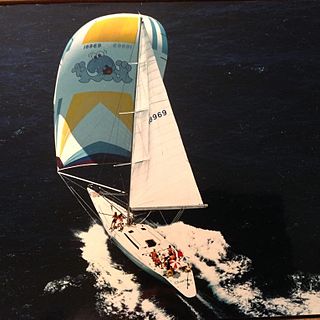
Stan Honey is an American professional offshore navigator with world sailing records and a businessman who founded Etak and Sportvision.














